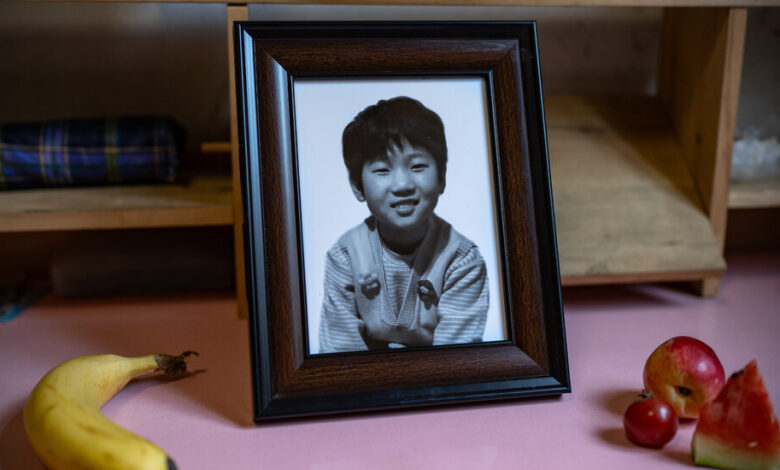China’s harrowing debate: Do children here have a crime problem?

For almost two years, Gong Junli has been waiting. Ever since his 8-year-old daughter Xinyue was stabbed multiple times and her body was left in a poplar grove in northwest China, he imagined her killer would finally be brought to justice. .
But justice is complicated when the defendant is also a child.
The boy police say killed Xinyue was 13 years old at the time. When his trial opens on Wednesday, it will try to answer a question plaguing Chinese society: How should China treat children accused of heinous crimes?
Countries around the world have long struggled to strike a balance between punishment and forgiveness for children. But the debate is especially notable in China, whose history of relative leniency toward young criminals contrasts sharply with the limited rights of adult criminal defendants. For decades, the government has emphasized educating and rehabilitating juvenile criminals instead of imprisoning them.
However, recently there has been a backlash. After a series of high-profile murders allegedly committed by children in recent years, many Chinese have called for the country to take tougher measures. And the government has responded. Xinyue’s murder was one of the first cases to go to trial since the government lowered the age from 14 to 12, at which point children could be prosecuted for murder and other serious crimes.
Several incidents this year have renewed the debate. In January, police in central China dropped charges against a boy accused of killing a 4-year-old girl by pushing her into a bin of excrement, because the boy was under 12 and too young to indicted, Chinese media reported. In March, police said three 13-year-old boys near the city of Handan, also in central China, dug a grave in an abandoned greenhouse, captured a classmate there and killed him. . The boys were indicted soon after.
On Chinese social media, hashtags related to the Handan murders attracted more than a billion views in one day, with legal scholars as well as ordinary social media users calling for the perpetrators to be severely punished, even the death penalty. Some argue that young people are more willing to commit crimes because they know they cannot be legally punished. A criminal law professor with more than 30 million followers on Chinese social media has accused those who seek to spare minors from punishment of “moral relativism.”
But others point to factors that may push children into crime, such as parental indifference or poverty. Many people in China worry that poor children in rural areas – who are accused in some of the most high-profile cases – are being neglected as a price for economic development. Many of these children are described as “left behind” because their parents left them at home while they searched for better jobs far away.
As public pressure grew, the Supreme People’s Court last month issued an order new instructions on preventing juvenile crime, including potentially holding guardians accountable for their children’s actions.
It also announced The court recently sentenced four children aged 12 to 14 to prison terms of between 10 and 15 years, the first time it has admitted trials of this age group. The court, which said the children had committed unspecified violent crimes, said it wanted to show “tolerance without mercy”.
Mr. Gong said Xinyue is a sweet-tempered child who likes the cartoon “Paw Patrol” and likes to eat mangoes and strawberries. On September 25, 2022, her grandparents were watching over her while Mr. Gong, a single father who worked in the construction industry, was at a construction site more than 100 miles away. That afternoon, Mr. Gong’s father called to say that Xinyue was missing.
Mr. Cung ran back to his village, a poor commune of about 40 households nestled among terraced fields of corn and potatoes in Gansu province. When he arrived, Xinyue’s body had been found.
Police arrested a 13-year-old neighbor boy. According to the indictment document shared by Mr. Gong, the boy, whom Mr. Gong said he saw around but did not know well, “developed a hatred for women” because he was “dissatisfied with his mother’s disciplinary methods.” ”. The boy placed a knife in the bushes, then led Xinyue there and stabbed her in the neck, the indictment said, citing physical evidence, witness statements and the boy’s confession.
It was unclear whether the boy, who the indictment said was being held at a local jail, had access to an attorney. Human rights activists have accused Chinese officials of sometimes extracting confessions under pressure. Local police and courts declined requests for comment.
Multiple attempts to reach the boy’s parents were unsuccessful. A press agency controlled by the Chinese Communist Party, Red Star Newsreported that they interviewed his mother, identified as Ms. Chen. Ms. Chen did not say whether she believed her son killed Xinyue, but she apologized and said she had offered compensation to Mr. Gong’s family.
Ms. Chen also said that her son was bullied and was forced to eat feces by classmates. And she admitted that she beat him because of his studies.
After the boy was arrested, Mr. Gong expected a quick resolution. But for more than a year, prosecutors did not charge the boy. Mr. Gong also expected a death sentence because there are many crimes that carry that penalty in China. When he learned of the law prohibiting the execution of minors, he was furious.
The law claims to protect minors, he said. But “will the child we lost be protected?”
China has long been considered relatively progressive when it comes to juvenile justice. some western countriesspeak An Ky Than, professor of law at Northumbria University in England. The international convention recommends 12 as the minimum age for prosecution. China in the 1970s set the minimum age of criminal responsibility at 14. (In the United States, the minimum age of criminal responsibility varies by state and most have no specific limit. whichever is lower.)
Especially in recent years, Beijing has encouraged prosecutors to transfer juvenile offenders to educational or community service programs. Worldwide studies Shows that thing Imprisoning juvenile criminals does not reduce recidivism rates. From 2008 to 2022, the number of juveniles sentenced plummeted nearly 70%.
But alternatives to prison have many flaws. Juvenile correctional facilities and reformatories are often supervised by police instead of specially trained personnel. Parents can choose not to send their children there.
Officials aren’t even sure what to do with those under 14. In 2018, a 12-year-old boy who police said killed his mother was killed allowed to return to school for a few days Later; Police said they had no other choice because they could not press charges.
Public outrage over that incident helped boost the government lower age Zhang Jing, a consultant with the China Association for Juvenile Crime Prevention in Beijing, said 12 people would be held criminally responsible by 2021.
It is unclear whether the juvenile crime rate is actually increasing. Supreme People’s Court recently announced that it sentenced 12,000 minors in the first three months of 2024, an increase of nearly 80% over the same period last year. But that may reflect changes in officials’ prosecutorial decisions, experts said, rather than an actual increase in juvenile crime. China does not make arrest statistics public. And social media has helped magnify individual cases.
The debate about punishment has in some ways overshadowed the conversation about prevention – and especially how to help the so-called abandoned children involved in some of these crimes. .
Studies have found that abandoned children – of which there are about 70 million – are more likely to be abandoned. being bullied or abused, partly because they may receive less supervision or affection. According to state media, the three suspects in the Handan case were all left behind, as was the victim.
In response, many Chinese have called on parents to return to their villages to raise their children or suggested that parents take responsibility if their children cannot do so.
But Professor Zhang in Beijing said those calls ignore the reasons why parents are separated from their children in the first place. China bans most children from attending public schools outside their homeland, making it difficult for workers to take their children with them.
“Punishing parents is useless. Wouldn’t it be better to change the parents’ environment? Professor Zhang said. He also called for more resources for recovery and prevention, such as police officers specially trained to deal with minors.
Mr. Gong also acknowledged the impossible choices many parents face. He himself often has to be away from home for weeks or months because his village has few jobs.
“Who doesn’t want to give their children and family a better life?” he say. “But everyone has to do it in their own way.”
Currently, Mr. Cung is staying near home, doing free work while waiting for trial.
Xinyue was buried in the forest where she died. Mr. Cung cut down poplar trees and planted peach and peach trees in their place. He imagined Xinyue being reincarnated and eating them.
Ly Huu And Tu Di Trieu research contribution




